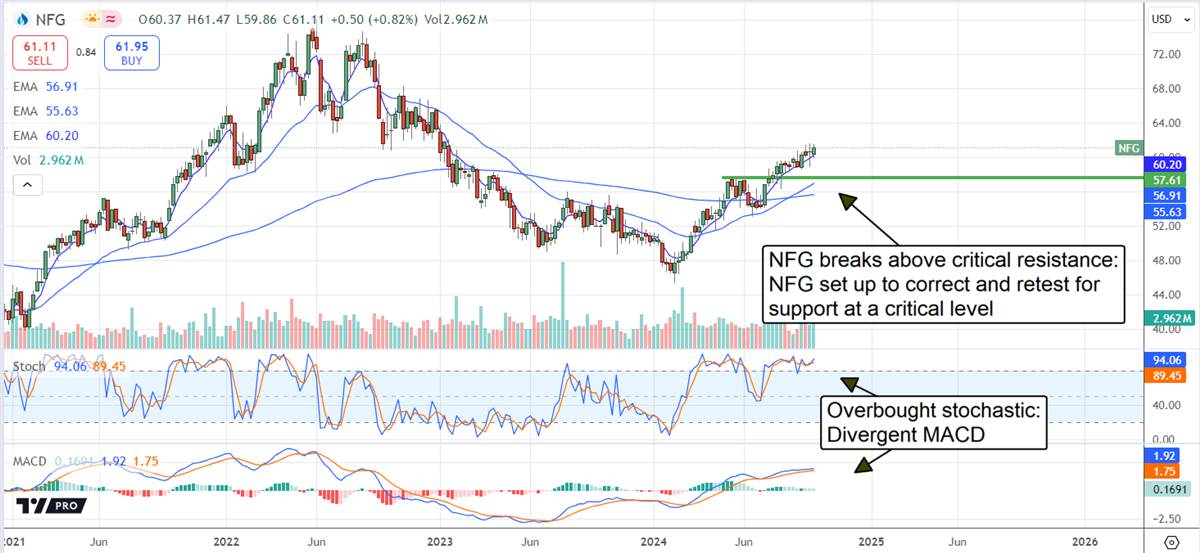- Congress members own a lot of National Fuel Gas stock, and there are some excellent reasons for this.
- The diversified energy play is well-positioned for an expected surge in natural gas demand.
- The balance sheet is healthy and allows for substantial capital returns.
National Fuel Gas (NYSE:NFG) is a smaller, diversified energy play with assets in Appalachia. The company is on track to produce nearly 400 billion cubic feet ((BCF) of natural gas in 2024, up double-digits from the prior year, with production growth expected to continue in 2025.
The company's operations range from exploration to production, midstream and gathering, and utility sales in the Pennsylvania and New York regions. Revenue is contracting despite the production growth due to falling natural gas prices, yet Congress is deeply invested and holding on tight. The outlook for natural gas demand growth, cash flow, and capital returns are among the reasons.
Due to increasing supply and availability, natural gas prices are expected to remain low over the next few years. The silver lining is the demand for natural gas volume is expected to surge, driven by increased availability and low costs. The critical detail for investors is that Natural Fuel Gas is already positioned to deliver when demand increases and generates cash flow today.
While lower prices will impact results in the production segment, the mid and downstream segments will offset the difference. Coincidentally, the government-regulated segments are supported by increasing base rates or the expectation that base rates will increase.
Republicans Bet Big on National Fuel Gas
Members of Congress own a substantial 532,000 shares of NFG stock, worth about 0.6% of the outstanding shares and 1.5% of the Subversive Unusual Whales Republican ETF (NYSE:KRUZ). KRUZ seeks to track the holdings of Republican Congress members and provides deep insight, along with the Democrat version, the Unusual Whales Subversive Democratic Trading ETF (NYSE:NANC), into their holdings.
Among the takeaways is that NFG is a significant holding for its size and concerning other energy positions, including Chevron (NYSE:CVX), ConocoPhillips (NYSE:COP), and Shell (NYSE:SHEL). Those stocks account for 5.5% of the portfolio, making energy a leading sector for the group. Democrats own virtually no energy stocks.
Results in 2024 are mixed, with revenue growing and earnings contracting, but the contraction has slowed, and a return to growth is expected. Natural gas prices are depressed but trending sideways near long-term lows, providing some stability for results while production and deliveries grow. The long-term forecast is for 10% earnings growth annually over the next several years, sufficient to sustain the healthy balance sheet and capital returns.
National Fuel Gas produced a positive cash flow quarter despite the contraction in earnings. The cash flow allowed sustained balance sheet health, dividends, and share repurchases. The repurchase program, initiated this year, reduced the count by 0.4% on average for the quarter to compound the dividend, which is substantial.
The dividend distribution, increased by 4% at the end of the quarter, is worth roughly 3.3%, with share trading near an 18-month high. It is reliable at less than 40% of the earnings forecast and can be expected to increase again in 2025. On the balance sheet, net debt is less than 0.85x equity, the cash position is solid, and equity is rising, so no red flags are present.
The Sell-Side Is Buying National Fuel Gas
MarketBeat.com tracks two analysts covering NFG stock as of Q3 2024, both rating it a Moderate Buy and expecting the stock to trade near its $62 floor. The consensus is another 17% higher, which may be reached soon due to the institutional activity. Institutions have robustly bought this stock on balance for eight consecutive quarters, with buying outpacing selling by 3:1. They own about 75% of the shares and may be expected to support the stock price action when it dips.
The stock price action is bullish, although consolidation or short-term correction is risky. The market is at an 18-month high, with overbought stochastic and diverging MACD showing potential for weakness. However, support is likely strong near the $57.50 level and will limit the downside, leading to the next technical entry point. 
